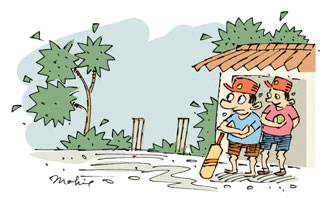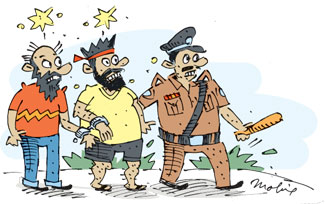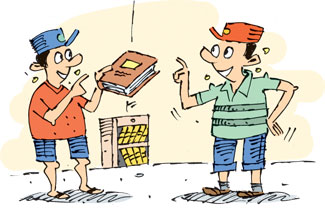|

by R. S. Karunaratne
Adverbial phrases with
‘because of’
At the outset, let’s make a distinction between an adverbial clause
and an adverbial phrase. In adverbial clause has a finite verb whereas
an adverbial phrase does not have a finite verb.
Sam could not read the book because he was sick. (Adverbial clause)
|

Children could not play because of the rain. |
Sam could not read the book because of his sickness. (Adverbial
phrase)
An adverbial clause or an adverbial phrase with ‘because’ answers the
question ‘Why?’
Question: Why couldn’t he read the book?
Answer: Because he was sick (Adverbial clause)
Because of his sickness (Adverbial phrase)
An adverbial phrase beginning with ‘because of’ is followed by a
noun.
Children could not play because of the rain.
People could not vote because of the bus strike.
Jagath failed the examination because of his poor handwriting.
Nobody could reach the peak of the mountain because of its height.
We could not revise our lessons because of the power failure.
The noun that follows ‘because of’ can have an article (a, an, the)
or a possessive pronoun (my, our, his, her, their) before it.
Many students loved their teacher because of her kindness.
|

They were arrested because of their lawlessness. |
I could not attend his wedding because of my sickness.
Lal passed the examination with flying colours because of his hard
work.
We learnt English well because of our dedication.
They were arrested because of their lawlessness.
[Activity]
Complete the following sentences with adverbial phrases using the
correct noun given within brackets.
1. Some students do not like difficult subjects because of
................................. (challenge / the challenge)
2. We like our neighbours because of ...................... (loyalty
/ their loyalty)
3. Children respect their English teacher because of
..................... (her integrity / integrity)
4. We couldn’t hear anything because of ..................... (noise
/ the noise)
5. The open air musical show was cancelled because of
................. (rain / the rain)
6. My parents are unhappy because of .......................
(examination failure / my examination failure)
7. People lose their belongings because of ...............
(carelessness / their carelessness)
8. Some people love elephants because of .....................
(intelligence / their intelligence)
9. Everybody loves Susila because of .........................
(beauty / her beauty)
10. The train was delayed because of ...................... (the
strike / strike)
Key:
1. the challenge,
2. their loyalty,
3. her integrity,
4. the noise,
5. the rain,
6. my examination failure,
7. their carelessness,
8.their intelligence,
9. her beauty,
10. the strike

Words are wonderful raw material to make sentences. They help us to
express ourselves eloquently. Here is a quiz to test your word power.
Tick off the meaning of the word in bold type in each sentence. Check
your answers with the key.
1. The Rubaiyat of Omar Khayyam consists of a group of quatrains by a
Persian poet.
(a) a poem or stanza of four lines
(b) a poem or stanza of three lines
(c) a poem or stanza of five lines
2. Prejudice is the quintessence of falsehood.
(a) the established view
(b) the most perfect embodiment of something
(c) careful analysis of both sides of a problem
3. It is difficult to find a business organisation untrammelled by
the rigidity of financial regulations.
(a) restrained
(b) governed
(c) unrestrained
4. The court will adjudicate the case before deciding on the amount
of compensation.
(a) dismiss
(b) hear and settle
(c) postpone
5. The appellate court upheld the verdict of the High Court.
(a) lower
(b) higher
(c) having the power to hear appeals
6. The soldier was accused of acting in collusion with the enemy.
(a) secret agreement
(b) opposition
(c) accordance
7. In the deposition made to the judge, the accused confessed to the
crime.
(a) testimony under oath
(b) affidavit
(c) evidence
8. Equity demands that a judge should listen to the prosecution and
the defence.
(a) equality
(b) what is just, impartial and fair
(c) equation
9. The judge ordered the police to exhume the dead body.
(a) cremate
(b) bury
(c) dig out of the earth
10. The millionaire died intestate.
(a) suddenly
(b) young
(c) without making a last will
11. The cost of litigation has gone up rapidly.
(a) appeals
(b) legal action
(c) confinement
Key:
1. (a) 2. (b) 3. (c) 4. (b) 5. (c) 6. (a) 7. (a) 8. ((b) 9. (c) 10.
(c) 11. (b)
Starters:
‘Will’,
‘Shall’
and ‘Going
to’ form
We use ‘will’, ‘shall’ and ‘going to’ form when we wish to indicate
the future.
Johnson is a globe-trotter. Today he is in Sri Lanka. Tomorrow he
will be in Malaysia.
Will you be at home this evening?
Don’t leave the fish on the floor. The cat will eat it.
|

I’ll bring the book tomorrow. |
I’ll probably visit the Taj Mahal when I go to India.
I won’t be (= will not be) here next year.
We often use ‘will’ with ‘I think’.
I think Daphne will pass the examination.
I don’t think that examination will be difficult.
Do you think that XYZ party will win the elections?
We do not, however, use ‘will’ for things we have already arranged to
do or decided to do. In such cases, we use the ‘going to’ form.
We’re going to church on Sunday.
Are you going to sign the contract tomorrow?
She is going to apply for the post.
They are going to demolish the old building.
He is going to leave for Australia next week.
We use ‘shall’ with ‘I’ or ‘We’ to indicate the future.
I shall be 20 tomorrow.
I think we shall win the match.
We do not use ‘shall’ with ‘you, they, he, she, it.’ We use ‘I will’
when we offer or decide to do something.
I’ll help you financially.
I’ll bring the book tomorrow.
Sometimes, we use ‘I think I will’ when we decide to do something.
I’ve won a lottery prize. I think I will buy a car.
It’s a rainy day. I think I’ll stay at home.
It’s a nice day. I think I’ll go for a walk.
We ask questions with ‘shall I’ or ‘shall we’.
There are mosquitoes. Shall I close the window?
Shall I bring the camera tomorrow?
What shall I wear for the party?
Shall we go now? Where shall we go for a cup of tea?
What time shall we meet?
Activity :
State whether the following sentences are right or wrong. If the
sentence is wrong, correct it. Check your answers with the key.
1. Your bag is very heavy. Shall I carry it for you?
................................................................................................
2. When I reach London I call you.
................................................................................................
3. I am hungry. I eat this mango.
..............................................................................................
4. Are you coming with me?
5. A: Did you call your mother?
B: No, I do it now.
.................................................................................................
6. A: How do you use this mobile phone?
B: Give it to me, I show you how to do it.
.................................................................................................
7. It’s raining. I don’t think I’ll go out.
..................................................................................................
8. I’m tired. I don’t think I’ll play cricket.
..............................................................................................
9. This shirt is too expensive. I don’t think I buy it.
..................................................................................................
10. I phone you tomorrow morning.
.................................................................
Key :
1. Right 2. Wrong. When I reach London I’ll call you. 3. Wrong. I’ll
eat this mango. 4. Right 5. Wrong. No. I’ll do it now. 6. Wrong. Give it
to me. I’ll show you how to do it. 7. Right 8. Right 9. Wrong. I don’t
think I’ll buy it. 10. Wrong. I’ll phone you tomorrow morning.
One word for many
Give one word for each group of words and check your answers with the
key. The first letter of each answer is given.
1. To breathe in : I ......................
2. To eat like an animal: D ...........................
3. To become less stiff: R .............................
4. To tell as a secret: C .............................
5. To spend the winter asleep: H ........................
6. To lay open: E ............................
7. To express regret: A ...................
8. To wipe out: E ............................
9. To try hard : S ...........................
10. To understand: C ....................
11. To make strong: F ...............................
12. To tear down: D ...............................
13. To irritate: P ............................
14. To stare in anger: G ..........................
15. To confuse: B ..........................
16. To think quietly: M ........................
17. To own up to a sin: C ..........................
18. To join together: U .........................
19. To talk over : D ........................
20. To regard with disgust: L ..........................
Key
inhale, 2. devour, 3. relax, 4. confide, 5. hibernate, 6. expose, 7.
apologise, 8. extinguish, 9. strive, 10. comprehend, 11. fortify, 12.
demolish, 13. pester, 14. glare, 15. bewilder, 16. meditate, 17.
confess, 18. unite, 19. discuss, 20. loathe
American and British English spelling
Some words are conventionally spelt differently in American English
(AE) and British English (BE). Here is a quiz to spot the difference
between American and British spelling. Write AE or BE against each word
and check your answers with the key.
1. Aesthetic ..................
Esthetic ..................
2. Aluminium .................
Aluminum .................
3. Anesthetic ..................
Anaesthetic ................
4. Analyze .....................
Analyse ....................
5. Axe ........................
Ax .........................
6. Behavior ......................
Behaviour ......................
7. Breathalyze .....................
Breathalyse ...................
8. Catalog .......................
Catalogue ..........................
9. Centre .....................
Center .......................
10. Cheque .....................
Check ........................
11. Color .......................
Colour ..........................
12. Defense ............................
Defence ...........................
Key:
Following words are used in British English.
1. Aesthetic 2. Aluminium 3. Anaesthetic 4. Analyse 5. Axe 6.
Behaviour 7. Breathalyse 8. Catalogue 9. Centre 10. Cheque 11. Colour
12. Defence |

